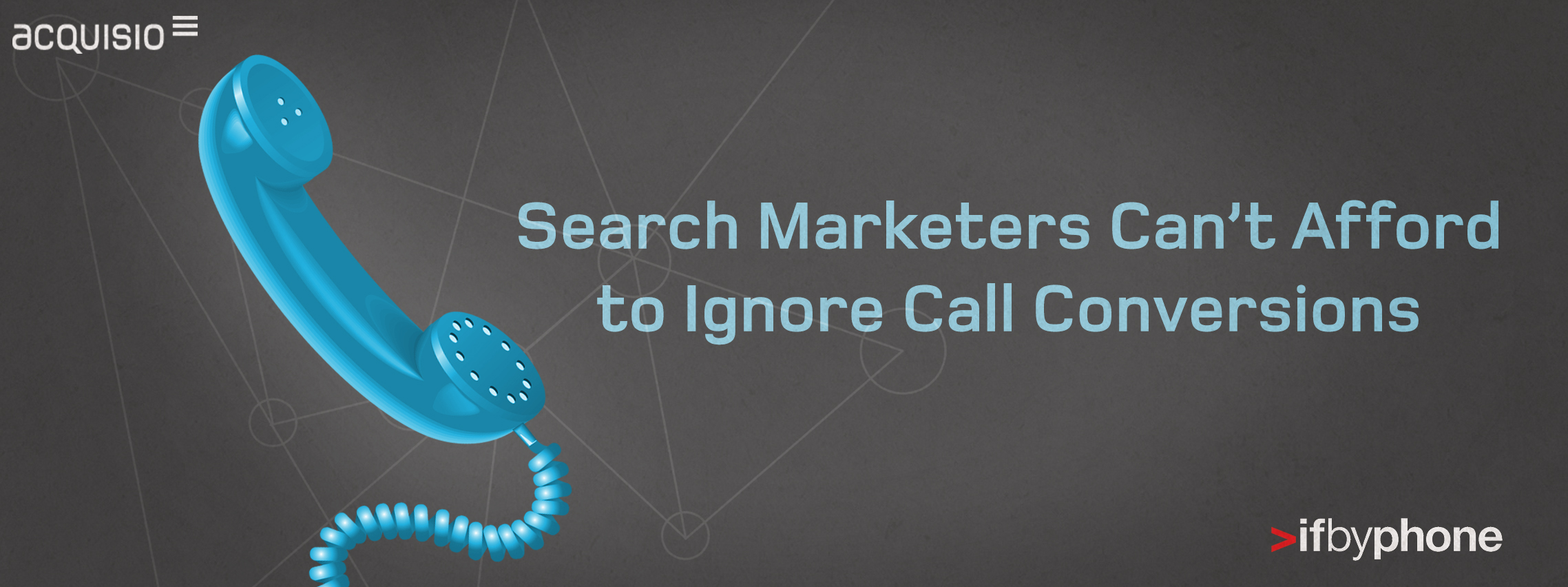This is a partner post by Ifbyphone, call tracking vendor.

Everyone today has a smartphone, and they are using those devices to find and contact businesses with increasing regularity. 25% of searches take place on mobile devices today, and that number is expected to surpass PC search by 2015, according to a recent study conducted by BIA Kelsey.
As search goes mobile, it’s important for marketers and SEM agencies to understand that when smartphone users find a business, they aren’t converting by filling out a web form – they’re calling.
Thanks to click-to-call, Google reports that 61% of mobile searches result in a phone call. 30 billion sales calls were made to businesses in the U.S. last year from mobile search, reports BIA Kelsey, and that number is expected to reach 75 billion by 2018. What’s more, studies show these phone leads are 10 times more likely to convert to revenue than web leads, making them the conversions search marketers most need to generate to optimize ROI.
Keyword-Level Call Tracking to Prove and Improve Search ROI
To compete on search engines like Google and Bing in today’s mobile world, you can’t afford to ignore phone calls in your analytics. Search has become too competitive, and the stakes are too high. It’s why search marketers are now in a race to adopt solutions to measure and control calls the same way they do web conversions.
Keyword-level call tracking solutions like Ifbyphone provide the critical missing piece to your marketing analytics puzzle. While competitors try to outmaneuver you using inaccurate and incomplete SEO and PPC data, you can use call attribution data from call tracking solutions to see what keywords and PPC ad and landing page variations are driving calls, opportunities, and revenue. You can then drive more calls and revenue by optimizing PPC campaigns and bid strategies for the most lucrative keywords, while simultaneously cutting spend on search terms, ads, and landing pages that aren’t driving calls and sales.
Ifbyphone and Acquisio Partner to Bring Call Conversion Data to Bid Management
If you use Acquisio to optimize web conversions from search advertising, you can leverage Ifbyphone’s call tracking data to do the same for call conversions. Ifbyphone’s call analytics can be integrated with Acquisio, so you can use it to automatically reallocate budgets to keywords and ads that drive both clicks and calls – while eliminating those that don’t.
Analyze, Score, and Route Calls Like Clicks
Search marketers and SEM agencies are very familiar with both analyzing and managing clicks and web conversions. It’s old hat. But many of you have yet to do the same for the calls you generate via search or other marketing programs.
Tracking each lead back to its source is a critical first step, but here are some other things to consider to optimize ROI from search-generated inbound calls:
- Track Sales, Not Just Calls: Generating calls is good, but generating sales is better. If a $20,000 monthly PPC ad campaign generates over 1,000 phone leads, that may seem like a good return. But what if none of those leads ever become revenue? Conversely, a similar campaign that generates 3 phone leads may seem like a failure – but not if those leads bring in $100,000 in revenue in the first month. When using call tracking data to optimize search advertising, you want to optimize on what’s driving sales, not just calls. Integrating your call tracking data with a CRM system like Salesforce can help.
- Call Scoring to Separate the Wheat from the Chaff: Not every call from search is sales-ready. Many are mundane inquiries for things like business hours and account information. Some will also be job requests, misdials, or solicitations. Paying search engines to drive these calls is bad enough, but you don’t want to compound the problem by having your sales staff waste time dealing with them. That’s why marketers often send calls to an IVR virtual receptionist first to answer and qualify callers. The IVR will ask callers the questions you determine work best to qualify them. It can weed out the misdials and solicitors, provide answers to callers inquiring about non-sales related matters, and score the leads to determine if they are really sales-ready. For the ones that are, they can be routed to a sales manager to assist.
- Route Callers to the Closest Store, Office, or Agent: Mobile search often means local search. Google states that 50% of all mobile search is local. What’s more, studies show these callers have high-purchasing intent, often making purchases or appointments within an hour of running a search. Routing mobile callers right away to the right place is important to capture that revenue, but it can be tricky. It’s not as easy as simply using the caller’s area code; you need more precision, plus a mobile caller can be calling from anywhere. Call routing solutions with geo-location technology can help. Geo-location determines a mobile caller’s precise location based on cell phone triangulation and automatically routes the call to the closest store, franchise, office, or agent to answer their questions, take their reservation, or process their purchase.
- Track Calls by Caller’s Location and Time/Day of Call: Understanding where callers are located geographically can help you advertise more intelligently. For example, if 60% of your callers are coming from New York and Chicago, you can bid more for Google mobile PPC ads targeting smartphone users in those areas. That strategy also applies to when in the day people are calling you. If most of your calls are in the afternoon, you may wish to reduce your PPC advertising spend during slower times.
- Include Call Conversion Data in A/B Test: Test everything. This is true for any marketing activity, but it is especially true for PPC landings where so much of your ROI rests on your pages’ ability to generate conversions. But if your A/B tests only measure web form conversion metrics without including phone call conversion data, you could be picking winners that aren’t driving the most leads, opportunities, and revenue. Using call tracking to see what landing page variations are driving phone calls can be a real eye-opener and an important metric in any A/B test.
Calls Are Now a Critical Part of Search, So Stop Ignoring Them
Search marketers have been optimizing campaigns to drive clicks and web conversions for years. Doing the same for phone calls is still a new concept for many, but thanks to the rise of mobile search, it’s now vital. You simply can’t afford to ignore what may be your most lucrative lead source. New tools exist to help, and the sooner you embrace them, the sooner they will reap their benefits.



